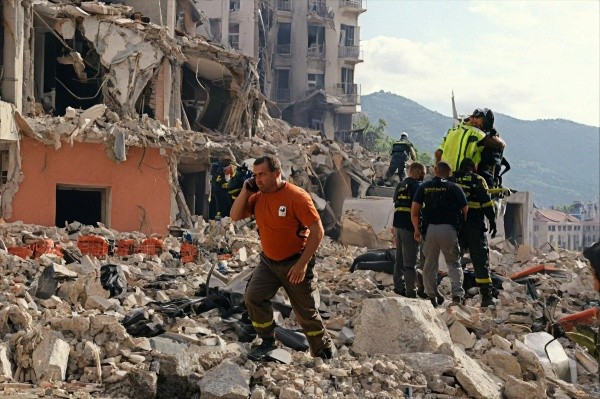Iran’s Plan to Strike Back Against the U.S.
Iran’s Military Preparations Following U.S. Attacks
Loading...

Plumes of smoke have been seen rising above Beirut as Israel strikes city after forced evacuation orders issued for four southern neighbourhoods.
Tensions Escalate as Israel Strikes Lebanon
In a significant escalation of hostilities, the Lebanese militant group Hezbollah has claimed responsibility for a drone attack targeting an Israeli military base located south of Tel Aviv. This marks the first time Hezbollah has employed a swarm of drones in such an operation. The attack occurred late on Wednesday, coinciding with renewed Israeli airstrikes on southern Beirut, which have resulted in substantial destruction and civilian casualties.
Details of the Attack
Hezbollah's statement confirmed that they launched a "squadron of attack drones" at the Bilu military base. However, Israeli authorities have not reported any immediate casualties or damage resulting from the drone strike. In addition to the attack on the Bilu base, Hezbollah also claimed responsibility for several other assaults, including strikes on naval bases near Haifa and another facility close to Israel's main international airport. Despite these attacks, operations at the airport reportedly continued without disruption.
Following the drone strikes, Israeli warplanes conducted extensive bombardments in various areas south of Beirut early Thursday morning. Eyewitness accounts and reports from local media indicated that multiple explosions were heard, with large plumes of smoke rising above the city. Lebanese television network Al Jadeed reported at least four significant strikes in the southern suburbs of Beirut.
Evacuations and Casualties
In anticipation of further attacks, Israeli military spokesperson Avichay Adraee issued urgent evacuation orders for residents in four neighborhoods of Beirut, including areas near the international airport. This warning came after a series of deadly Israeli strikes in Lebanon, which, according to the Lebanese Ministry of Health, resulted in at least 40 fatalities and over 50 injuries in the eastern Bekaa Valley and the city of Baalbek on Wednesday alone.
Political Context and Future Prospects
The ongoing violence has prompted discussions about the potential for political resolutions. Hezbollah's new secretary-general, Naim Qassem, expressed skepticism regarding the effectiveness of political negotiations in halting Israeli aggression. He suggested that indirect negotiations could be possible if Israel ceased its bombardment of Lebanon. Qassem emphasized the need for a clear path to negotiations through the Lebanese state and parliamentary speaker Nabih Berri.
Despite calls from the Lebanese government for a ceasefire and the implementation of UN Resolution 1701, analysts believe that a resolution is unlikely in the near future. Al Jazeera correspondent Zeina Khodr reported that the prevailing sentiment in Lebanon is one of pessimism regarding new diplomatic initiatives, particularly with the upcoming U.S. presidential transition. Concerns are growing that the situation may escalate further in the coming weeks.
Humanitarian Impact
The ongoing conflict has had a devastating impact on the civilian population in Lebanon. Over the past year, Israeli strikes have claimed the lives of more than 3,000 individuals, with the majority of casualties occurring in the last six weeks alone. The humanitarian crisis continues to deepen as the violence shows no signs of abating, leaving many in Lebanon fearful for their safety and uncertain about the future.
As the situation develops, both Hezbollah and Israel appear poised for further confrontations, raising alarms about the potential for a broader conflict in the region. The international community watches closely, hoping for a resolution that can bring an end to the suffering of civilians caught in the crossfire.
Editor
Iran’s Military Preparations Following U.S. Attacks
Troops remain in five strategic locations, raising fears of renewed tensions and long-term occupation.
Opposition forces have taken control of the capital after a significant offensive. Here is how it unravelled.
